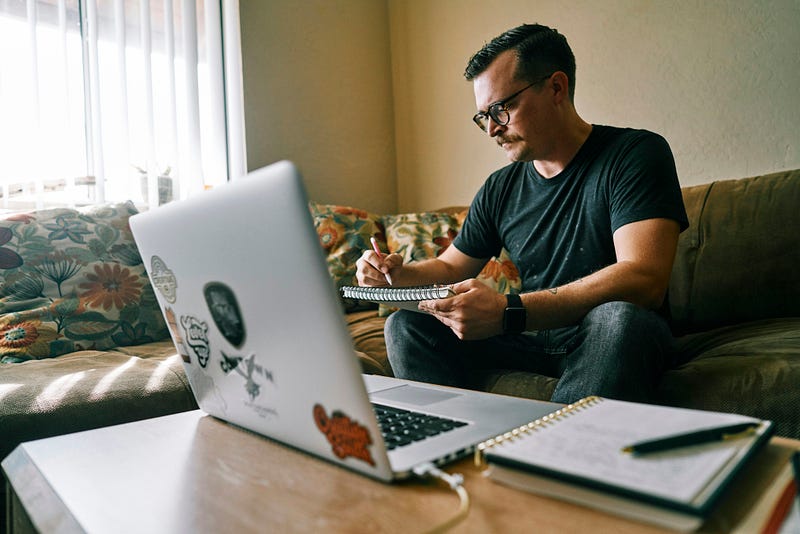I used to think confidence was something you were either born with or faked your way into. I’d see others speaking up in meetings or walking into a room as if they owned it, and I’d wonder, “How do they do that?” So, for a while, I tried to copy them — mimicked their tone, posture, and even phrases. But it always felt off, like I was pretending.
It took me a while to realize that true confidence isn’t about pretending to be someone else. It’s about being comfortable with who you are.
Let that sink in.
Confidence isn’t about puffing your chest out or acting like you have it all figured out. The people who try too hard to appear confident often come across as the most insecure.
Here’s how I slowly built confidence without faking it, and how you can too.
Know Your Stuff
I had to give many presentations during my time in college. At first, I was very nervous, and it showed when I was up there saying my lines. It took me a few trial and errors to dig deeper and understand the root cause of my lack of confidence. It wasn’t because of my mindset or personality. It was due to my lack of knowledge about the content. Next time, I went fully prepared, and my confidence grew 10x (literally).
Nothing builds confidence like competence. Whether it’s your work, a hobby, or the ability to hold a good conversation. The more you know, the more grounded you feel.
Confidence comes from preparation. Don’t aim to be the loudest person in the room. Be the most prepared.
Keep Promises to Yourself
Every time you say you’ll do something and then don’t, you chip away at your self-trust. Real confidence is built with integrity with yourself first.
Start with small things, such as waking up when you say you will, going for that walk, finishing a task, or calling a friend. These little wins add up.
There was a time when I’d make grand plans to work out every day, write at 8 a.m., and follow a strict diet. But I used to fail by day three. Then, I began setting smaller, achievable goals, such as 10-minute workouts, writing 200 words a day, and eating home-cooked meals. Slowly, I became someone who follows through.
Self-trust is the foundation of self-confidence.
Get Comfortable Being Uncomfortable
Confidence comes from repetitively putting yourself through discomfort. Eventually, nothing uncomfortable will affect you. You never become nervous if you begin to embrace discomfort.
I’ve begun doing difficult things, such as taking cold showers, prioritizing the most challenging tasks first thing, and speaking to strangers, to build confidence. I once joined a speaking group (Toastmasters) to get over my fear of public speaking. My hands shook during my first talk. My voice cracked. But no one laughed. They nodded, smiled, and encouraged me.
I learned that people are usually rooting for you more than you think. And every time you learn into discomfort, you expand your comfort zone.
You don’t need to be fearless to be confident. You just need to act despite the fear.
Stop Comparing
Comparison is a confidence killer. There will always be someone smarter, richer, better-looking, or more successful. If you measure yourself against others, you will never succeed.
Social media makes this worse. It’s a highlight reel, not real life. I’ve learned to mute or unfollow accounts that make me feel “less than.” Not because I’m bitter, but because I’m protecting my mental space.
Confidence grows when you stop measuring your worth through someone else’s lens. Learn to be comfortable in your own skin.
Speak Kindly to Yourself
Your internal dialogue shapes how you show up in the world. If you constantly tell yourself you aren’t good enough, you will act like it.
Start catching your inner critic.
Would you speak to others the way you talk to yourself? If not, change the tone. When I catch myself thinking, “You always mess this up,” I pause and reframe: “You are learning. You will get better.” It sounds cheesy, but it works.
How you speak to yourself becomes how you believe in yourself.
Conclusion
“Fake it till you make it” doesn’t really work in real life. It might give you a temporary boost in motivation, but what you actually need is to become it while you build it.
Confidence is not about having all the answers. It’s about trusting that you can figure things out along the way. Start with honesty and celebrate small wins. Do things that make you uncomfortable, even if they are difficult. Show up as you, imperfect and growing. That’s the kind of confidence that lasts.
—
Sign up here to receive my weekly newsletter about creativity, self-improvement, and online writing.




